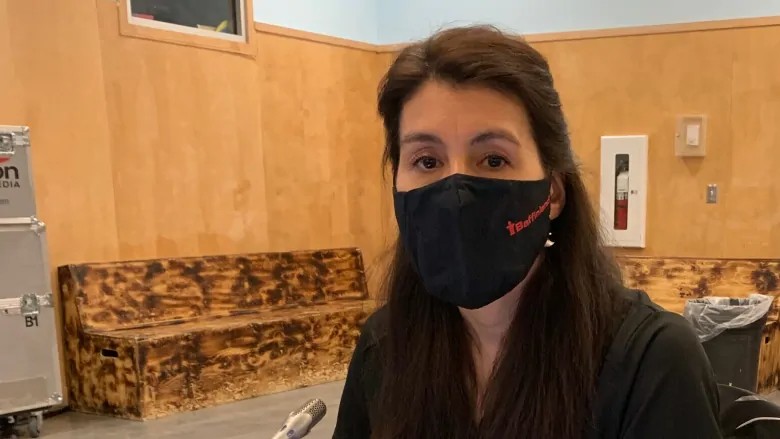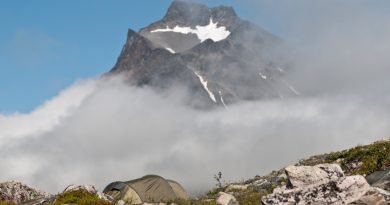Nunavut mine in Arctic Canada says it’s not allowed to harm Inuit harvesting

Baffinland reacts to the blockade and a community call to slow down its expansion
In the wake of last week’s blockade, Baffinland Iron Mines Corporation says it has heard the call to slow down plans to expand production at the Mary River mine.
“It’s unfortunate that they felt they had to go to those extremes to be heard,” said Udloriak Hanson, Baffinland’s vice-president of community and sustainable development, about the protesters who blockaded the mine’s airstrip and trucking road for a week.
Baffinland wants to double the mine’s output from six to 12 million tonnes of iron ore by building a railway and increasing shipping through a narwhal habitat. The protesters say that would damage the environment, and affect their harvesting rights.
Hanson told CBC News this week that the land claim will protect communities from that kind of damage.
“The scenarios that have been put out there, such as, we’re going to lose our culture, or we’re going to lose our harvesting ability, our harvesting rights, the company, first of all, would not want to ever have it come to that point, but it wouldn’t be allowed,” she said. “There are so many checks and balances along the way that would close and stop our operations to ensure that does not happen.”
Hearings for an environmental review for the Mary River mine expansion will continue in Iqaluit, starting on April 12. The Nunavut Impact Review Board says the hearing are meant to give more time for communities to speak and ask questions.
Community trust missing
Hanson says Baffinland is open to making changes, such as a slower annual increase to the number of ore carriers that visit its port at Milne Inlet, while impacts on marine mammals are studied.
“If we were doing such a terrible job, I believe (communities) would want us to shut down,” Hanson said. “But that has not been the message. They have said they would like us to slow down and they would like us to find ways to show them how we are listening.”
The mine says it already has years of environmental monitoring to build on.
“We wouldn’t be starting from scratch,” Hanson said.
What’s missing is communication about that research and the trust of communities, she said.
Despite territory-wide support for the protest, Hanson says, the company is still hopeful that the expansion will go ahead.
“We’re still hopeful that we can find that happy medium, where people see that monitoring is happening, that the mitigation measures are adequate and in place, and that we’re able to avoid as much impact as possible,” she said.
The mine says it needs the expansion approved to see any future profits made at Mary River. Still, slowing down is an option, she said.
Talk benefits with QIA instead, Baffinland tells protesters
Meanwhile, Baffinland is pushing for a court injunction that would make sure another blockade can’t happen. A temporary order against the blockade is already in place while a judge deliberates the case. The protesters’ lawyer, Lori Idlout, will cross examine Baffinland’s CEO this week.
The blockade ended after the temporary injunction order was made and when Inuit leaders promised to meet with the protesters, who call themselves Nuluujaat Land Guardians, in person.
The guardians say their focus is on the environment, which they say they have a duty to protect as hunters.
But Baffinland says it’s also being inundated with complaints that communities impacted by the mine are not seeing the financial benefits they would expect from large scale development on their land.
The mine employs more than 288 Inuit who are currently on COVID-19 relief pay because of the pandemic. No Nunavummiut are working on site right now. The mine also supports local communities through food vouchers and a harvesting fund and is promising to build a training centre in Pond Inlet.
At the same time, Hanson says Baffinland is paying millions in land leases and royalties to the regional Inuit organization. If the expansion happens, the company is promising more than $2 billion to Inuit organizations over the life of the mine.
Communication with regional leadership
Baffinland has said to communities that the Nunavut Agreement and a related Inuit Impact Benefit Agreement stipulate the money is controlled by the Qikiqtani Inuit Association.
CBC News asked Hanson what it was like to be paying millions of dollars to Inuit organizations, and then be told by Inuit communities that they aren’t seeing that money.
“I mean, it’s awkward,” she said. “What we’ve tried to do is provide information to the communities on where we have control of benefits.”
While the mine takes some responsibility to explain how mining revenue is governed, she says, communities have to take these concerns up with their regional leadership.
“We just hope that the entire proposal isn’t sacrificed as a result of these discussions,” she said. “This has definitely brought a lot of awareness that some things may need to change in order for communities to be happy.”
Related stories from around the North:
Canada: Mine blockade sparks solidarity protests across Nunavut, Canada, CBC News
Finland: The Arctic Railway – Building a future or destroying a culture?, Eye on the Arctic
Greenland: Canadian geologist raises questions about controversial Greenland mining project, Radio Canada International
Sweden: Reducing emissions could create up to 3,000 new jobs in Arctic Sweden says mining group, Radio Sweden
United States: Conservation groups sue government over Alaska mining road, The Associated Press




Baffinland distroying animals it may not be so ..but animals will take different migration path..of any animals..but the land will be distroy for ever..and will become waste Land. Hunting areas will no longer be used by traditional hunt places..this traditional place will be gone forever..